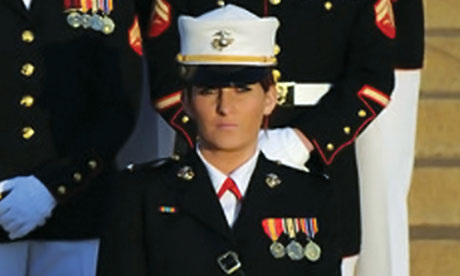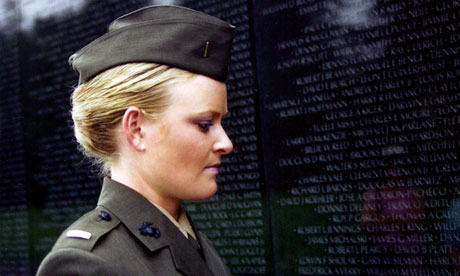
Ariana Klay claimed she was raped by a senior officer and her civilian boss.
'He hit me across the left side of my face … and my face hurt so bad. He screamed at me and he grabbed my arm and he raped me." Kori Cioca's heartbreaking account of her rape by a commanding officer while serving in the US Coast Guard is not the most shocking part of her testimony. Following the attack, Cioca was told by her superiors that if she went forward with her case she would be court-martialed for lying; her assailant, who admitted the attack but denied rape, then received just 30 days of base restriction and loss of pay and the US Department of Defense continues to refuse to pay for the surgery she needs for the nerve damage to her face.
Cioca is just one of the women interviewed in The Invisible War, a feature-length documentary that lifts the lid on the abuse of women in the US military and which got its first UK screening in the Frontline Club in London last week.
The film has raised similar concerns this side of the Atlantic that rape is a hidden scourge in the military. According to figures released to Labour MP Madeleine Moon, a rape or sexual assault is reported by a member of the armed forces every week. Over the past two and a half years, there have been 53 reported rapes and 86 reported sexual assaults in the army, the navy and the air force, but Moon believes the figure is an underestimation and could be as many as an attack a day.
Between 2001-2011, Ministry of Defence figures show 56 members of the armed forces were court-martialed for sexual offences – of these, just 16 resulted in a conviction.
UK screenings of The Invisible War are in the pipeline, as is its release on iTunes in the UK, while its makers are urging UK viewers to host their own screenings.
Lifting the lid on the extent of the abuse is vital to tackling the problem of rape in the military, says Amy Ziering, producer of the film, which was directed and written by Kirby Dick. "There is a perfect storm of conditions to keep this secret," she says, speaking from Los Angeles. "There is no incentive to report rape, it is not treated as a priority in the military and the nature of the crime means that it is so implosively devastating that many women get the blame, or blame themselves."
The statistics revealed in The Invisible War, which won the audience award at this year's Sundance film festival, make shocking reading: a female soldier in combat zones is more likely to be raped by a fellow soldier than killed by enemy fire, over 20% of female veterans have been sexually assaulted while serving in the US army, of 3,192 sexual-assault reports in 2011 only 191 members of the military were convicted at courts martial.
Rape within the military has been exposed before – the Tailhook Association meetings in 1991, the Aberdeen Proving Ground in 1996 and the Air Force Academy in 2003 – but it has rarely been done with such a devastating combination of first-person testimony, watertight research and high-level interviews.
Through the testimony of victims and their families the extent of that devastation is laid bare, as well as the failings of a system that sees a rape victim's commander decide whether to take action after a rape report.
Ariana Klay, who graduated with honours from the US Naval Academy and served in Iraq, describes her violent rape by a senior officer and her civilian boss. "He said that if I told anybody, that he was gonna have his friend Marv, from Indiana, kill me and throw me in a ditch, 'cause that's how they took care of things in Indiana," she tells the camera. When she reported the rape she was told to do "what a Marine officer should do, and that's to ignore it and move on," and she alleges the Marine Corps said she must have welcomed the assaults because she wore makeup and skirts – part of her regulation uniform.
"The thing that makes me the most angry," says Klay, "is not even the rape itself; it's the commanders that were complicit in covering up everything that happened."

Lieutenant Elle Helmer: brought a case against her commanding officer in the US
The film shows Andrea Werner, who reported her rape to her army superiors, only to be charged with adultery, even though it was her assailant who was married; Lieutenant Elle Helmer, whose case against her commanding officer at the Marine barracks in Washington DC, was closed owing to "lack of evidence" before a new case was opened charging Helmer with conduct unbecoming of an officer and public intoxication.
Ziering was instrumental in getting the women to open up about their horrific experiences. She readily agrees that her gender invariably played a role: "I became very emotionally involved in the victims' stories, it was what drove me, and I wanted the film to have that heart and passion," she says.
Ziering finds the documentary world "more welcoming and equitable" for women than Hollywood. "There is absolutely no balance in the movie world. It is so bleak there are so few women directors, it's still very much an all boys club. It's just horrible," she says, though she notes the "big star" directors in documentaries still tend to be men.Dick and Ziering's film has already had a far-reaching impact: offers of financial donations and support for victims have been made after almost every screening and when US secretary of defense Leon Panetta watched the film earlier this year he ordered military commanders to hand over all sexual-assault investigations to a higher-ranking colonel, and announce the creation of a special victims unit in each branch of the armed forces.
Ziering reveals that some commanders are using the film as a training tool, showing it to new recruits. "My real hope is that in 10 years' time there is not another film made about this. We're going to keep the pressure on – this can't just be allowed to blow over."
No comments:
Post a Comment